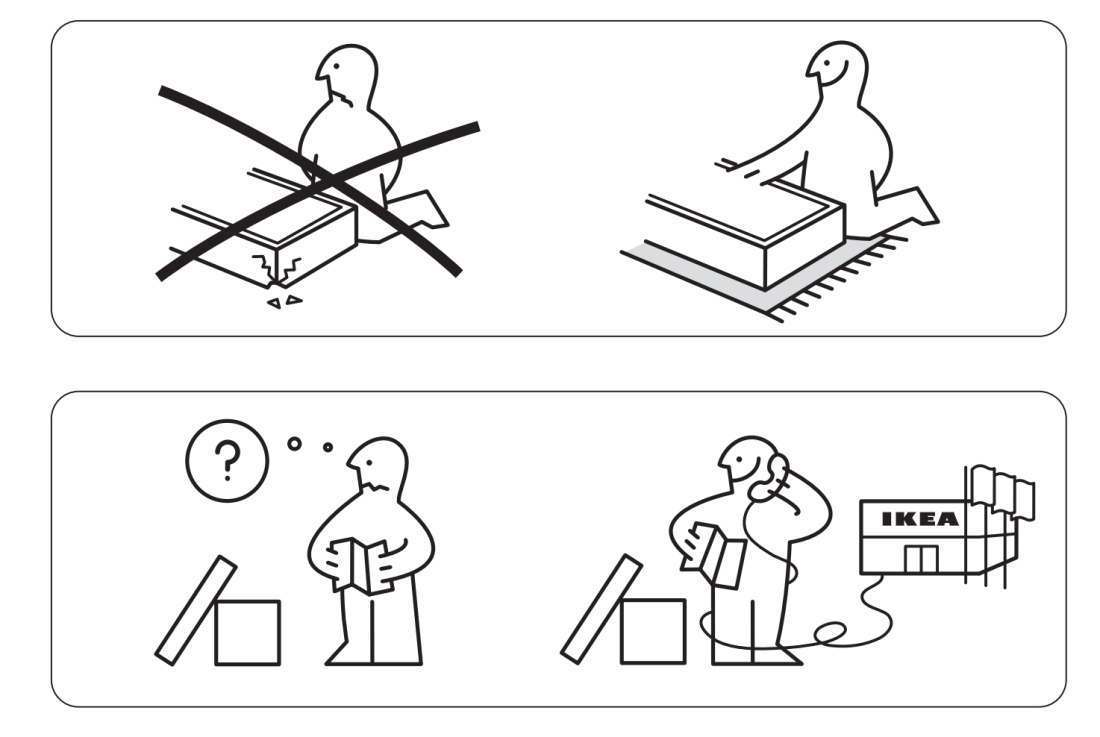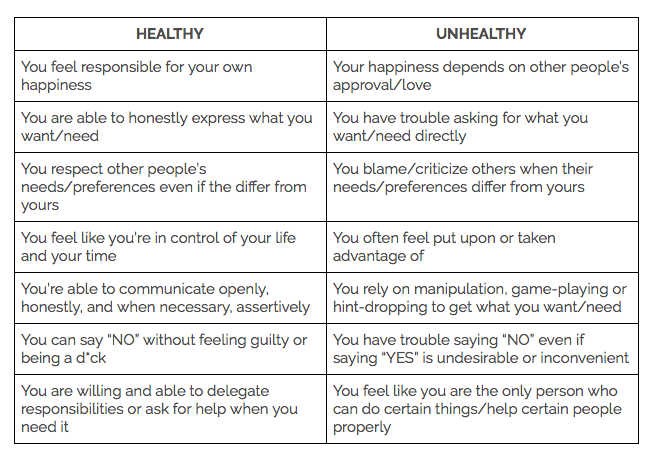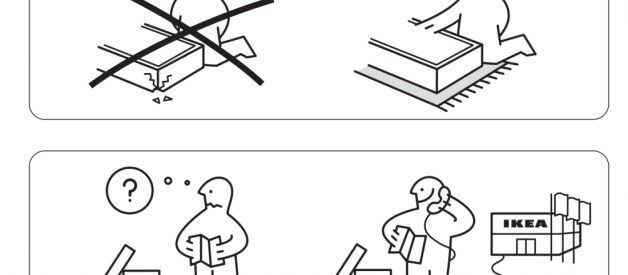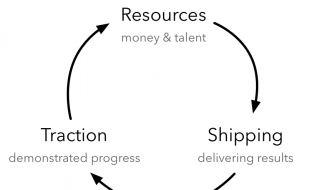Wish you could be kind, generous, and loving ? without feeling taken advantage of? Here?s your guide to setting (and keeping) healthy boundaries ? and reclaiming your life!

Raise your hand if any of these scenarios sound familiar:
- You?re heading out the door for a long-awaited vacation when your boss drops an urgent task in your lap? and you promise her you?ll squeeze in a few hours of work to get it done.
- Your mother invites you over for dinner, but you have other plans. You don?t want to upset her, so you practically kill yourself trying to get to both events.
- Your teenage daughter ? who can?t seem to get enough of her iPhone ? objects to you checking up on her usage. So you sneak a peek at her phone every night when she?s sleeping.
If you raised your hand in response to any of these scenarios, I?ve got news for you: you?ve got some work to do on setting (and keeping) boundaries.
Now if you?ve heard this before ? if someone has told you to stop being such a doormat, for instance ? don?t worry. You are definitely not alone.
Better still, this is a curable ailment. And in this post, I?m going to explain exactly how.
The Truth About Boundaries
The vast majority of people struggle to set and keep healthy boundaries. It?s one of those ?seems simple, but actually isn?t? things in life. Kind of like putting together some IKEA furniture. It sounds simple? but comes with a really confusing instruction manual.

Most of us learn and develop boundaries pretty early in life. As children, we observe how people react to different behaviors ? and we generally adapt our behavior to minimize stress and conflict and maximize love and approval.
The problem is that this sort of adaptation can result in suppressing our true wants and needs, people-pleasing, and living with an ingrained (and unconscious) fear that if we ask for what we want or disagree with someone we love, they?ll stop loving us.
This is especially true for women who are taught at an early age to put others ahead of themselves (though there are plenty of men who have the same issue).
The most surprising thing I?ve discovered in working with hundreds of women (and a few men) on setting & keeping healthy boundaries is that they?re often not even aware that their boundaries are so squishy (or nonexistent). If you suspect you might one of those people, try taking this quick, 10-question quiz >>
What exactly is the difference between a healthy boundary & an unhealthy one? Here?s a handy table that highlights seven examples of healthy vs. unhealthy boundaries:

If you find the words in the right-hand column apply to you, keep reading. We?re going to reset those unhealthy boundaries ? and reclaim your life!
HOW TO SET & KEEP HEALTHY BOUNDARIES ? EVEN IF YOU THINK YOU CAN?T
Robert Frost once said ?Good fences make good neighbors.? I love this metaphor, because it truly fits.

Your boundaries are your metaphorical fences. And YOU are the gate-keeper who decides who you let, who you keep out, and how far you let someone inside the gate.
The purpose of setting a healthy boundary is, of course, to protect and take good care of yourself. And to avoid the inevitable feeling of being a well-worn doormat which comes with always saying ?YES.?
So how do you set (and keep) healthy boundaries ? that protect you from emotional bankruptcy without leaving you friendless and alone?
Step 1 is to CHALLENGE YOUR BELIEFS.
Putting others? needs ahead of yours, being a people-pleaser and generally having squishy boundaries is a sure sign of an unconscious (or perhaps conscious!) belief that you?re not ?good enough.? It?s a reflection of your self-worth ? and it?s a major trigger of the fear, guilt and self-doubt that leads you to say ?yes? when ?no? refuses to leave your lips.

The thing is ? you TEACH people how to treat you.
So when your boss asks you to put in a few hours of work during that much-deserved (and way overdue) vacation ? and you say YES ? you?re teaching her that you?ve available anytime, no matter what.
You?re implicitly saying, ?Your time, needs, and priorities are more important than mine. So I?ll put my needs aside and sacrifice my time and priorities to make you happy.?
No bueno!
When I say ?challenge your belief that you?re not good enough,? I mean that first and foremost, admit that the belief exists. (You don?t have to admit it publicly, but at least admit it to yourself.)
Admit that you?re afraid the other person won?t like, respect or value you if you don?t give them what they want (when they want it). Admit that you feel guilty speaking up for yourself or saying ?no? to someone you care about.
And while you?re at it, admit that putting other people?s needs and wants ahead of yours is leaving you drained and often, feeling taken advantage of.

?I?m not enough?? isn?t the only belief you?ll have to challenge if you want to set healthy boundaries and reclaim your life. You?ll also have to challenge the belief that the worst will happen if you stand firm. (i.e., if you tell your boss that you?re not willing to work over vacation, she?ll fire you ? or at the very least, she?ll think you?re not committed enough to get that promotion she?s been promising.)
Whatever your ?worst case scenario? is, play it out in your mind.
Will your mom really stop loving you if you don?t have dinner with her every Wednesday?
Will your boyfriend dump you if you admit that you?re really not that into sports?
Will your friends really disown you if you don?t make homemade cookies for the school bake sale?
Chances are, whatever it is you imagine as the ?worst case scenario? will never come to pass. That doesn?t mean there won?t be consequences (we?ll get to that in a minute), but rarely will they be as awful as your imagination leads you to believe.
Oh ? and by the way, even if the answer is YES to one of your ?worst case? scenarios? maybe you?re better off dating a guy who?d rather be hiking on Sundays instead of parked in front of the TV, drinking beer.
Maybe your mom will take up a hobby to fill a few Wednesday nights and you?ll have something new to talk about when you get together.
In other words? maybe the worst case scenario is a blessing in disguise?
The third belief you?ll need to challenge is the ?I?m-the-only-one? belief that so many of us fall prey to. As in, ?I?m the only one that Stacy can turn to when she?s feeling low.? Or ?I?m the only one who knows how to create this report the way the boss wants it.?
Sure, your ego likes feeling important and ?mission-critical.? But again, the truth is often obscured by your unconscious beliefs.
Stacy will likely find someone else?s shoulder to cry if you?re unavailable (she probably already has). Your co-workers might not create the report to your boss? exact liking ? but maybe she?ll actually appreciate you more when she recognizes how much better your version always is.
Again ? you teach people how to treat you.
Do you want them to treat you like a doormat? Or like a person they value and respect?
The answer is obvious (I hope). And if you want to be respected and valued, you have to start by respecting and valuing YOURSELF.
Step 2 is to get crystal clear about what you will/won?t do.
Maybe you?ve been complaining to anyone who?ll listen that you work too many hours. You?re exhausted, burnt out, and you haven?t seen the inside of a gym in over a year.
Complaining about it wont change diddly. Instead, define a clear, specific boundary that reflects the way you?d like your reality to be.

For example, instead of ?I work way too many hours!? say, ?I?d like to leave the office no later than 7pm every night.?
If you know you?ve tried and failed in the past to stick to this kind of ?goal,? make it even more unambiguous. For example: ?I will never stay in the office past 7 p.m. (or work on weekends or vacation), no matter how pressing a deadline, because it will make me worse off and super-cranky the next day.?
Now let?s talk about enforcing that crystal clear boundary?
Step 3: Get clear about the consequences.
There?s no point in setting boundaries without setting consequences that you?re willing to enforce. I can?t tell you how many times I?ve had a client or member of my Ignite Your Inner Badass program tell me that they?ve ?tried everything? to get their partner to be kinder and more communicative ? including threatening to leave ? but still, nothing has changed.
Guess what?
When you make an idle threat ? like leaving a relationship that you?re not actually willing or prepared to leave ? and then don?t follow through, the only thing you?re accomplishing is teaching the other person you?re all talk and no action and giving them a perfect excuse to continue the same old behavior.
So rule #1 of setting a consequence to go with your boundary is be willing and ready to enforce it.
If you?re not at a point in your relationship where you are ready to leave, then don?t say that you will leave. Try a more enforceable consequence, like staying at your mother?s house until your partner is ready to be more open with you. Or my personal favorite ? no sexual intimacy until there?s more personal intimacy.
You don?t have to put up with demands or behavior that makes you feel like poo-poo. You always have a choice.
So take some time to rationally and honestly consider the consequences that you?re both willing to enforce ? and that are most likely to lead to the change you desire.
And never, ever forget to follow through.
Step 4 is the final piece of the healthy boundary puzzle: communicating honestly ? and without blame.
If you?ve been acting like a doormat, you may find this step to be the most challenging. Put on your Big Girl panties, and do it anyway.

Beating around the bush, sugar-coating the truth, manipulating, being passive-aggressive or couching your feelings in bullshit phrases like ?I?m just saying?? is a waste of time and energy.
You may get what you want (this time), but you?ll only reinforce your own belief that you?re not ?enough? (see Step 1). And the vicious cycle will continue.
It?s high time you free yourself from all the game-playing and learn to express your wants and needs ? honestly and without blame.
For example, if you?re sick and tired of your teenage son acting pissed off, but blowing off every effort you make to ask him what?s bothering him, you might be tempted to force the issue. You might try demanding, using ultimatums, bribing, snooping, begging, or accusing him of being a nasty little monster who is breaking your heart by shutting you out (not that I?ve ever said anything remotely like that! Ahem.)
Try this approach instead:
?Honey, when I ask you what is wrong, and you say ?nothing,? then proceed to slam doors or kick the wall, and seem to be angry, I feel frustrated that you refuse to communicate with me, as if I am supposed to read your mind. If something is bothering you, I?d prefer that you take some time to cool off, and then communicate with me.?
No blame. No game-playing. Just a clear expression of how you feel and what you want.
If he still continues the same behavior, add in a specific and appropriate consequence. For example, the next time that he asks to borrow your car, say, ?I?d love to give you the car keys, but I?m afraid I can?t this time. I?m worried about what?s bothering you, which you haven?t yet shared with me, though you continue to slam doors and express your anger without any explanation. As your parent, I?m responsible for what you do in the world, and I can?t in good conscience let you get behind the wheel of a car when you?re clearly pissed off about something.?
It might not be easy to set boundaries and enforce consequences when all you want to do is scream, cry or blame the other person for making you feel lousy, but I promise you, nothing gets heard or accomplished when it comes out in anger or hidden behind a veil of B.S.
So get used to taking the ?you? out of these statements and frame them instead with ?I? ? as in, ?I feel frustrated/angry/insert adjective of choice when XYZ happens.?
It?s a small shift that will have a big impact on the quality of your relationships and the outcome of difficult conversations.
FINAL THOUGHTS?
Setting boundaries take courage, practice ? and support. It is perfectly okay to ?start small,? and ease your way into it.
If you?re ready and willing to reclaim your life and learn how to be kind, loving and generous ? without being a doormat ? sign up for my free Ignite Your Inner Badass audio training. You?ll get an MP3 file and a PDF Action Plan that guides you through simple, daily steps (that take just 10 minutes or less!) designed to undo the self-defeating cycle of people-pleasing and self-doubt ? and ignite the badass that already lives inside of you.
Grab your free badass-igniting audio training right here >>


